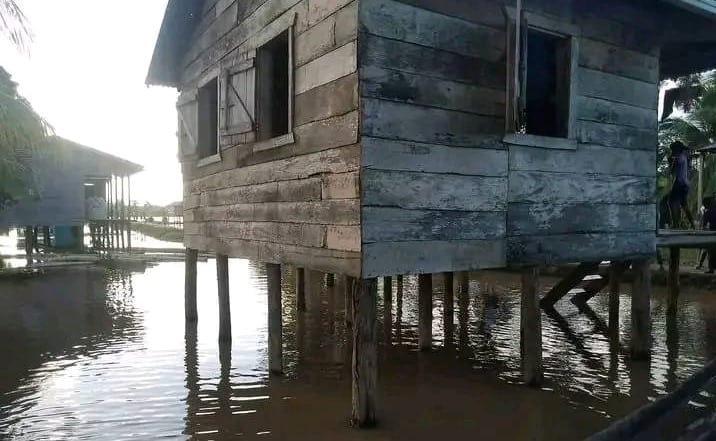30 de julio 2022

Children of Exile: The Births “Sowing Hope” in the Camp of Nicaraguan Farmers

PUBLICIDAD 1M
PUBLICIDAD 4D
PUBLICIDAD 5D
The past month’s rains caused serious flooding that washed away the crops that would normally be harvested at the end of July and beginning of August

The past month’s rains caused serious flooding that washed away the crops that would normally be harvested at the end of July and beginning of August
Some 30 communities that form part of the indigenous territoriesLi Lamni, Li Aubra and Wangki Maya are facing a food crisis, due to heavy rains and flooding. The affected areas lie along the Rio Coco [Coconut River] in Nicaragua’s North Caribbean region. The crops that community members would normally be harvesting around this time – late July to early August – were washed away by floods caused by last month’s rainfall.
“Jose” [not his real name] is an advocate for the rights of the indigenous peoples. He explained that with on site visits and the contacts they maintain with community leaders of those territories, they were able to confirm that over 30 communities were affected by the flooding, which greatly damaged the rice, bean, banana and corn crops, among others.
“The situation in the territories of Li Lamni, Li Aubra and Wangki Maya is very difficult, in terms of food security, a way of generating income, in addition to the outbreak of illnesses. There’s a lot of hunger, and great need (..) as well as the government’s abandonment of the region and the lack of an investment plan to strengthen the agricultural community and promote some way to generate income,” Jose elaborated.
“Petronila”, 47, is one of the community members from Li Aubra who was affected by the loss of their crops. She explained to Confidencial that her community is based on agriculture. They plant corn, rice, plantains, beans, malanga and sugar cane, but this year, she lamented: “the community has suffered greatly, because floods have destroyed all our crops.”
“The problem in the communities is very great. The rice we planted was completely covered over by water, by mud. It was going to be harvested in August, but now it won’t be possible to eat even [rice], so it’s a serious problem,” she affirmed.
She added that other flooding effects the territory is dealing with include the death or loss of their animals, some of which they would have sold to have some income and be able to buy the food they’re no longer producing. Adding to this, is the spread of diseases like flu and malaria, especially among the children.
“Pedro”, 27, lives in the territory known as Li Lamni. He also spoke of the food problem that the communities in his territory are suffering. He stressed the urgency of the situation and appealed to the authorities and civil society to support them with “food products for immediate consumption, because the families can’t wait for the next harvest.”
He underlined the fact that the communities in the Li Lamni territory have been “gravely affected” since mid-June when the flooding began. “When crops are under water for a long time, they rot.” Many people lost their banana, rice and corn crops.
“The harvest was lost, and that triggers a serious food problem, especially for feeding the children,” he emphasized.
Both community members agreed on the urgency of receiving support from the government authorities, with seeds and tools to replant their lands. In addition, they requested that the community health clinics be supplied with medicine, since there are outbreaks of illnesses, and they can’t obtain any kind of medications.
“Jose” offered a more detailed list of the communities affected by the flooding. They include: Sang Sang, Asag, Kitaski, San Esquipula, Krasa and Santa Rosa, in the Li Lamni territory; Polo Paiwas, Klisnak, Cocal, Naranjal, Esperanza, Santa Fe, El Carmen, Wis Wis, Santa Ana, Lagun Tara, San Jerónimo, Bul Sirpi and San Alberto, in Li Aubra.
In the territory known as Wangki Maya, he listed KiwasTara, Raya pura, Auhya Pura, Andris, Belen Klampa, Boom, Sawa, Uran, Neblina, Sih, Livinkrik, Utla Mahta and Planhkira.
The advocate for the indigenous communities underlined how important it was that these communities receive “support for their agricultural production, to allow them to generate income while leaving the forest intact and improve the existence of a circular economy among communities.”
“The people have no way of getting ahead with their own resources – they need help,” he reiterated.
On July 15, the Prilaka Foundation informed through their social networks that the indigenous territory of Wangki Maya was in a “state of emergency”, since “the floods continue, causing famine and disease.”
In addition, they warned that in the next months the indigenous communities that lie along the Rio Coco would need “humanitarian aid for nutrition, and collaboration for restoring their agricultural capacities.”
This article was originally published in Spanish in Confidencial and translated by Havana Times
PUBLICIDAD 3M
Confidencial es un diario digital nicaragüense, de formato multimedia, fundado por Carlos F. Chamorro en junio de 1996. Inició como un semanario impreso y hoy es un medio de referencia regional con información, análisis, entrevistas, perfiles, reportajes e investigaciones sobre Nicaragua, informando desde el exilio por la persecución política de la dictadura de Daniel Ortega y Rosario Murillo.
PUBLICIDAD 3D